1,000 Day Practice Live Stream – Three things necessary for the eradication of suffering
To be free from suffering, three things are important. First, you need to be free from the desire for food, clothing, and shelter. In everyday life, we are attached to these. If you are not attached to these, what you need is a small amount of any kind of food to maintain physical strength, clothes to protect yourself from cold and heat, and a place to sleep. If you can take your basic needs lightheartedly like this, you won’t have to struggle throughout your life.
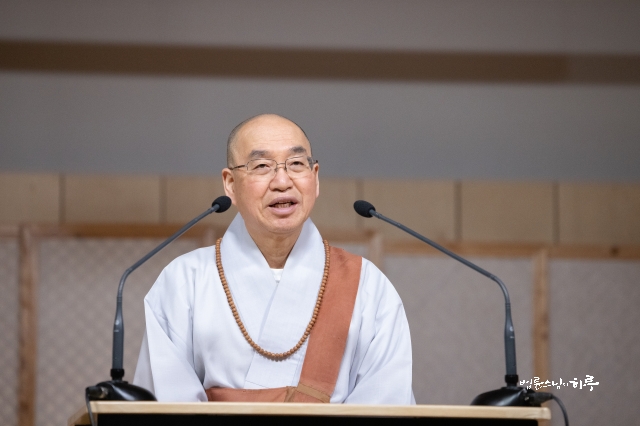
I am not saying that you shouldn’t eat food, wear clothes, or sleep. I am simply recommending that you do these as circumstances allow instead of becoming attached to them. But it is difficult to do that. So the Buddha said that we should let go of all our attachments to these things. If you can cut off these attachments, for example by living on donated food and clothing, and sleeping under a tree, you will be at ease. If you are not attached to these even while living as a layperson, you won’t judge whether your food, clothing, or shelter is good or bad. You should be free from these desires.
Second, you should let go of judging something or someone as right or wrong. Insisting “I am right and you’re wrong” creates hatred, frustration, and despair. When you win, you could easily become arrogant and look down on others. When you lose, you could easily become disheartened. If you are free from judging something or someone as right or wrong, most of your afflictions will disappear.
Therefore, from today, let go of judging something or someone as right or wrong in your work life and family life, your family relationships and work relationships. You might think, “Still, shouldn’t we judge something or someone as right or wrong?” But if you take a step back and look at it, you will find that it is not that important. To win isn’t such a good thing. If you recognize that you and the other person are just different and look at the situation at some distance, you will see that being right or wrong is only momentary and it is nothing when the situation passes. Therefore, the Buddha entreated us to let go of judgment.
Third, we shouldn’t be at the whim of our feelings. This means that we shouldn’t cling to the feelings of good, bad, pleased, sad, distressed, or pleasant.
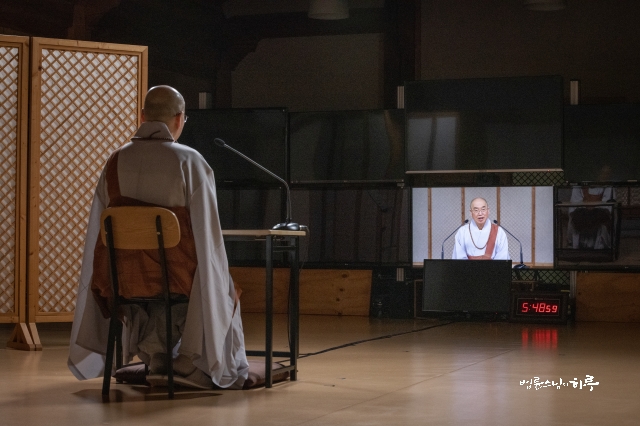
These three things are the most important things for the eradication of suffering. If you can apply these three things in your everyday life, you can live as a free person without suffering. Anyone can do this if they can be aware of the feelings arising in them without becoming attached.
The reason we practice each morning is to maintain this perspective in our everyday life. But doing morning practice doesn’t automatically make this possible. After trying to apply this principle in our everyday life, we examine if we have strayed from it and resolve to stick to it again—that is morning practice.
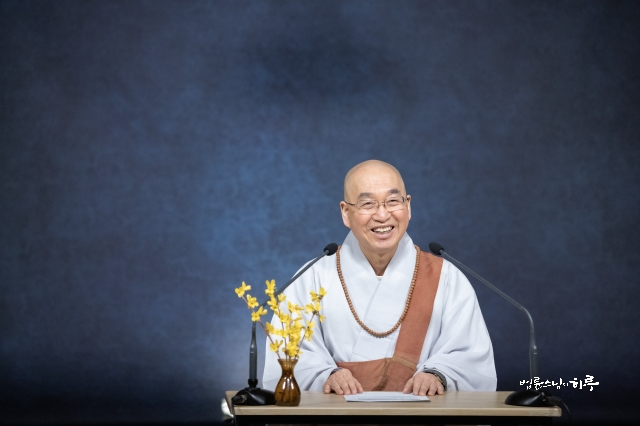
Dharma Assembly to commemorate the Buddha’s Parinirvana – Today marks the 2565th year of the Buddha’s Parinirvana. On this Parinirvana Day, let’s take a look at his last days.
Buddha’s Last Days
The Buddha went into a sala grove and lay down beneath the trees. Then, he said, “Today in the last watch of the night, Tathagata’s Parinirvana will take place.” In the scripture, it is said that flowers rained down from the sky and the sala trees were in full bloom, even though it was not the season for flowering. Astounded by such mysterious phenomena, Ananda asked the Buddha what had happened and the Buddha said:
“It is the last offering made to the Tathagata by heavenly beings. Yet, Ananda, it is not the greatest offering made to the Tathagata. The greatest offering is to practice earnestly according to the Tathagata’s teachings.”
We must remember this. Any mysterious phenomenon can’t hold a candle to earnest practice. And the Buddha continued:
“Go now and announce to the townspeople, ‘Today, in the last watch of the night, Tathagata’s Parinirvana will take place, come and see him for the last time.’”
He meant that they shouldn’t regret after the Tathagata’s Parinirvana that they had missed the opportunity to see him while he was alive. On his way back, Ananda was grief-stricken. The great teacher he had attended to for 25 years was to pass away that night and he was heartbroken, even if he was a practitioner. He went into the forest and wept. The Buddha sent someone to bring him. And the Buddha told him:
“Ananda, you have served the Tathagata excellently and devotedly for the last 25 years. You know the right time to be near, the right time to be away, the right time for people to have an audience with the Tathagata, and the right time to refuse it.”
“Dear Ananda, however, all compounded things are subject to decay. This is the way of the world. No one can change this. Have I not told you this many times? The Tathagata is not a body but the wisdom of enlightenment. My body leaves you now but the wisdom of enlightenment will remain with you forever. Do not grieve. The Sutras (discourses of the Buddha) and the Vinaya (disciplinary precepts) will be your teacher when I am gone.”
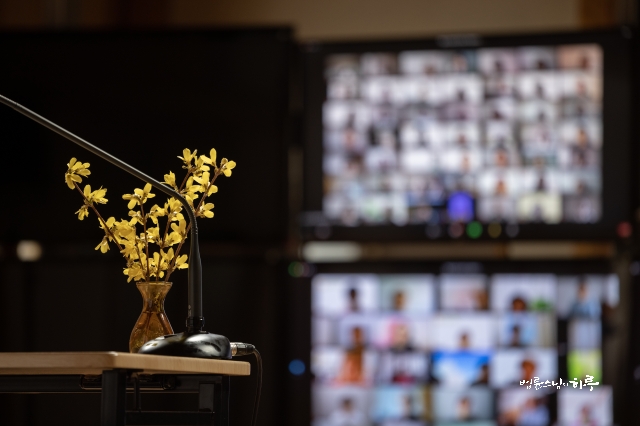
And the Buddha summoned the monks and said:
“Ask now if you have any doubt because I will enter Parinirvana tonight. Do not regret later, when I am gone, that you failed to ask me. Ask now if you have any questions.”
But they were all silent.
The Buddha said again: “If it is out of respect for the teacher that you don’t ask, let a friend inform a friend.”
They still remained silent. When no one asked a question even after the Buddha urged them to ask three times, Ananda said:
“Not even one of us is in doubt or perplexity as to your teachings.”
Then the Buddha entered dhyana and passed away peacefully.
Three things the great teacher left behind
The body of the great teacher ceased to be but his words remained as sutras, his deeds, vinayas, and his mind, dhyana. In Zen (Seon) Buddhism, more emphasis is put on the mind than the words and deeds, as the saying goes: what the mind thinks, the heart transmits. Theravada Buddhism puts emphasis on the sutras, the records of the discourses of the Buddha. Whereas the Vinaya school of Buddhism puts emphasis on the Buddha’s deeds. In other words, the emphasis is put on the way the Buddha lived and practicing what the Buddha taught.
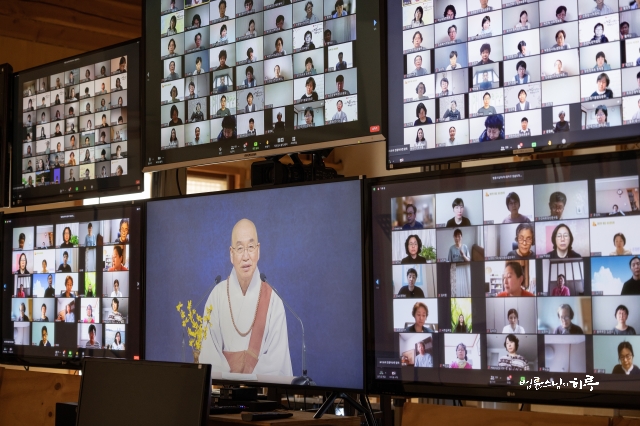
However, these can’t be divided. The Buddha’s mind, his words, and his deeds, all these are very important to us. Instead of asserting something based only on one aspect of the Buddha’s life—as a blind person makes an assertion after touching only a part of an elephant—we need to emulate his mind, words, and deeds as a whole. We need to observe the precepts as well as cultivating dhyana, and attain wisdom by listening to his teachings as well as observing the precepts. We need to undertake the Threefold Training, the training in the precepts (sila), concentration (samadhi), and wisdom (prajna), together. One who takes refuge in the Three Jewels of the Buddha, Dharma, and Sangha and takes the Threefold Training of precepts, concentration, and wisdom is a practitioner.
Around the end of the Dharma talk, Sunim asked the audience to raise their hands if they had practiced consistently for the last eight days. With the online conversion of Jungto Society, the eight-day special practice in commemoration of the Buddha’s renunciation and Parinirvana also took place at each member’s home. Lastly, Sunim emphasized that we need to practice consistently, regardless of time and place.
Practicing consistently, regardless of time and place
We need to practice consistently, regardless of time and place. If we have an access to a Dharma hall, we can practice there. If we don’t, we can practice at home, if we don’t have a home, we can practice outside; when we are in a forest, we can practice in the forest, when we are under a tree, we can practice under a tree, when we are at church, we can practice at church, when we are abroad, we can practice at a cathedral, for example.
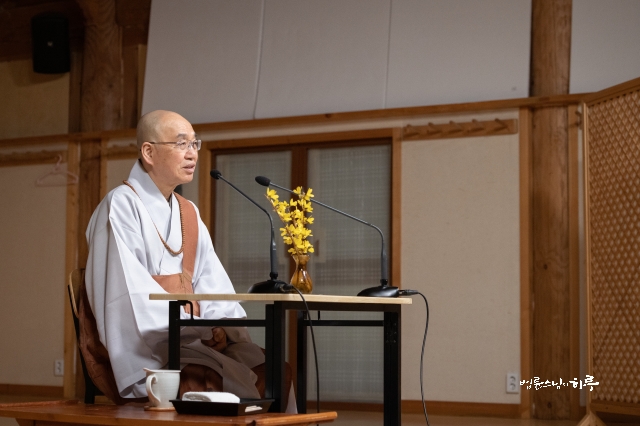
“One whose mind is pure is a practitioner, the place where the practitioner stays is a temple, and this is Buddhism.”
This is the motto of Jungto Society. Therefore, I hope you practice earnestly at your own Dharma hall. Only when this is firmly established can Jungto Society grow. If we fail to accomplish this, Jungto Society is bound to shrink. If this happens, even if we have emphasized practice all along since our establishment, people will say:
“After all, Jungto Society is just another religious organization. They seemed to practice when they had Dharma halls and Buddha images, but it all came to nothing as they practice at home.”
Why don’t you practice earnestly? Is it because you think, “How can I get blessings by praying at home?” We are not seekers of blessings but practitioners who move toward sustainable happiness by waking up from ignorance. I hope you reflect on what the Buddha taught over and over again today.




